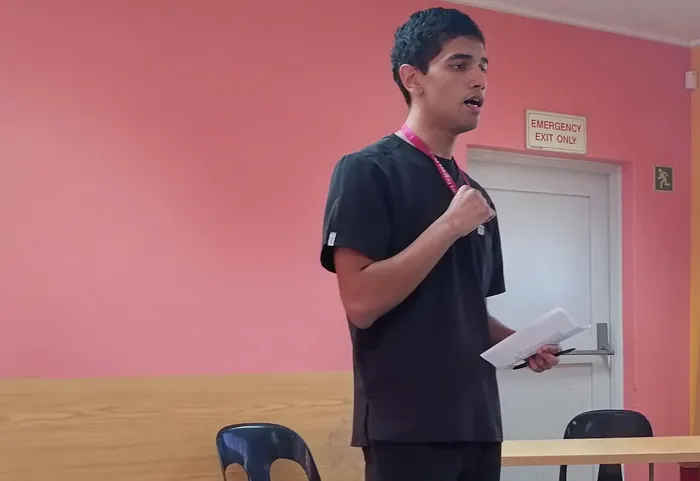More awareness about teenage pregnancy needed
Teenage pregnancy is a topic that needs to be spoken about, according to fourth-year University of Cape Town (UCT) medical students who held a workshop at Heideveld library.
Healthcare workers from various Community Health Centres (CHC) attended the workshop last Wednesday, April 24.

Fourth-year medical student at the University of Cape Town, Timothy Fortune, addressed the healthcare workers.
Image: Nabeelah Mohedeen
Timothy Fortune, a fourth-year UCT medical student, said they visited the library, various churches, the sports field, and went to people's homes to gather information about which social-ills affected the community.
He said according to residents, neighbourhood watch members, and CHC workers, teenage pregnancy was among the top issues. He opened the floor to residents to give reasons as to why they thought this was the case.
Heideveld resident Asheekah Green, said teenagers needed support from their families, communities, schools, and mostly from their parents.
"Everyone has a different home environment. They need support to speak to someone about their situation. Parents also need to be educated," she said.
Mr Fortune said the team's aim was to provide healthcare workers with a strategy on how to address a pregnant teenager.
He said that many teen moms were not comfortable with speaking to anyone about their situation but the "Setup" strategy was helpful:
- S-Seating/Standing must be comfortable for the patient.
- E- Environment should be quiet and private.
- T- Time. Don't rush the patient and allow them to speak.
- U- Understand the purpose - be clear on what you are there to discuss.
- P- Prepare yourself mentally and emotionally for a sensitive topic.
The aim of the strategy, he said, was to educate healthcare workers on how to support pregnancy, legal and safe abortion, the laws regarding abortion, contraceptive use, how to counsel teenagers, and, statutory rape.
He said consultation was important and the body language of healthcare workers could make the patient comfortable or uncomfortable.
"Have empathy, reemphasize confidentiality, respect their emotions, normalise their feelings. Allow time for questions. Speak with your body. Have an open posture, look approachable, be friendly. Build a good relationship with your patient," he said.
Important questions to ask the teen mom
- When did you find out that you are pregnant?
- Have you seen a nurse or doctor yet?
- Do you have any pain, bleeding, or any other changes you're worried about?
- Have you spoken to an adult you trust about the pregnancy?
- Are you in a safe space? Are you supported?
- How do you feel about your pregnancy?
- Would you like to know anything about the pregnancy? If they do refer them to a nurse.
- How is the situation at home? Have you told anyone at home?
- Is there anyone pressuring you on what to do next?
- What is your plan about school/work?
- Do you know who the father is and is he supportive?
- Have you booked yet? If not, refer patient to CHC.
Contraception
Many teenagers don't know about family planning methods, said Mr Fortune. Community healthcare workers, he said, have the power to educate communities about sexual health and contraception. The emergency contraception better known as the "morning after pill" must be used within five days after unprotected sex.
Warnings
- Never use two condoms at the same time because it is made out of latex and can break during sex.
- Use the condom correctly.
- Do not reuse condoms.
- Use water-based lubricant and not oil-based as this can break condoms.
- Check expiry date of condoms.
Side effects
Mr Fortune said even if you take a contraceptive, you need to use condoms to prevent sexually transmitted infections (STIs). Some people have an allergy to latex and this must not be confused as STI symptoms.
"Very common amongst teenagers is that the boy might not want to use a condom and the girl feels pressured. It is important to empower girls to say no. It's important to teach girls and boys about this," he said.
Important
- Any sexual act is considered rape or sexual assault under 12 years old.
- Anyone aged 12 to 15 may consent to sex with someone also aged 12 to 15.
- Sexual activity for this group with someone older than 16 is statutory rape, unless: the older person is 16/17 years old, and the age gap is not more than two years.